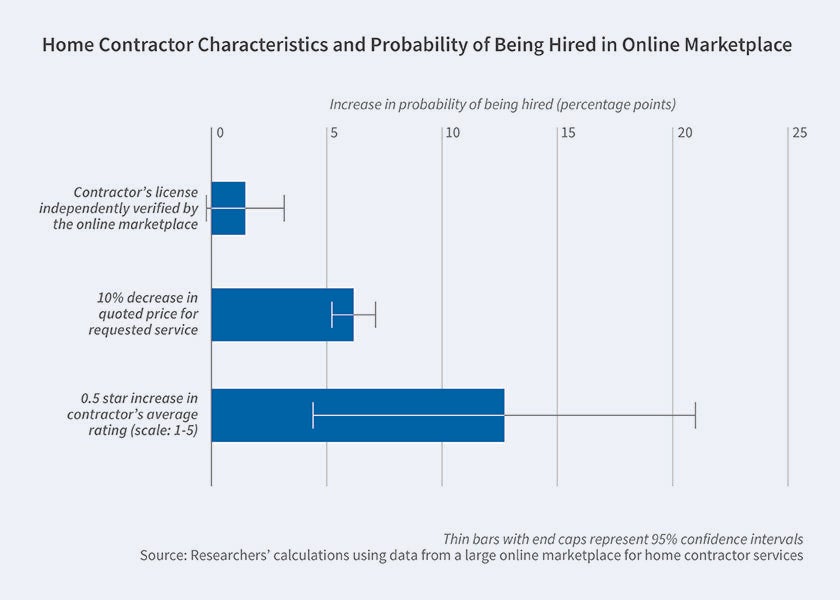Consumers Value Reviews and Prices More Than They Do Licenses
More-stringent licensing regulations are associated with less competition and higher prices, but not with better service or higher customer satisfaction.
Licensing laws apply to a growing share of the US labor force. They now affect nearly 30 percent of all workers, including electricians, contractors, interior designers, salon specialists, and at least 1,100 other occupations. Licensing is often justified as a way of protecting consumers from poor service outcomes, guaranteeing at least some minimum standards of quality and safety. However, these laws may raise prices for consumers and increase rents for licensed professionals by restricting competition.
Does a professional’s licensing status have an effect on whom consumers choose to hire? And do occupational licensing laws protect consumers from poor service outcomes? Chiara Farronato, Andrey Fradkin, Bradley Larsen, and Erik Brynjolfsson explore these questions in Consumer Protection in an Online World: An Analysis of Occupational Licensing (NBER Working Paper 26601). They study data collected by a digital platform to better understand the role of occupational licensing laws in consumer choices and market outcomes.
The researchers analyzed data from a large online labor market that facilitates connections between potential consumers and potential providers of home improvement services. Consumers use the platform to post a request for a particular job, to which professionals can respond with a quote. For each bid, the consumer can see the proposed price, read reviews of the professional in the form of either a starred rating or past-customer reviews, and learn whether the professional is licensed. A professional is only identified as licensed after the platform has independently verified the licensure.
The platform creates a market for the performance of physical tasks that are often supplied by licensed professionals, and its bidding process makes it suitable for studying whether and how knowledge of occupational licenses matters where reputation and other information about professionals are readily available. The researchers study transaction-level data on over one million consumer requests in hundreds of distinct service categories throughout the United States over an eight-month period.
The results suggest that a professional’s licensing status is unimportant for consumer decisions, relative to review ratings and prices. The researchers also find that more-stringent licensing regulations are associated with less competition and higher prices, but not with any improvement in customer satisfaction, as measured by review ratings or the propensity to use the platform again.
The finding that consumers appear to care more about online reviews and prices than occupational licensing can be interpreted in several ways. One is that licensing may not be important for consumer decision-making. Another is that consumers may not distinguish between licensed and unlicensed professionals if they believe that all professionals comply with relevant state regulations when bidding for a particular service, either by being licensed or by providing services of comparable quality to those of licensed professionals.



